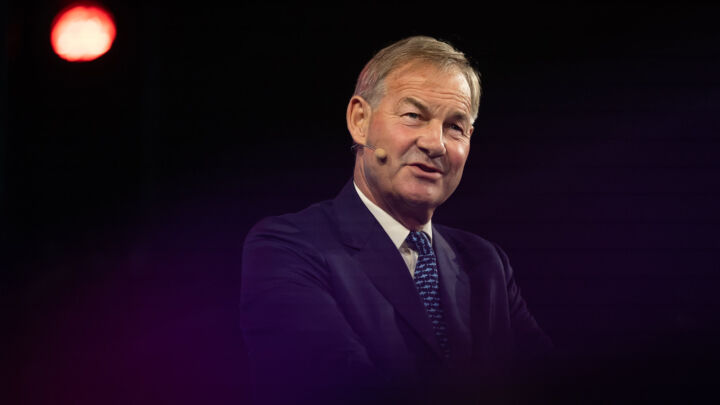How Ozzy Osbourne bit back
The critics sneered and the tabloids gawked, but he died a near-enough national treasure.

Want unlimited, ad-free access? Become a spiked supporter.
What has struck me most about the tributes to Ozzy Osborne, who died yesterday aged 76, is how respected and respectable he has finally become. After all, both he and Black Sabbath, the band he fronted, were for years treated as figures of ridicule and objects of derision. In their 1970s heyday, well before Metallica made it acceptable and before Motörhead t-shirts became urban chic, heavy metal was deeply unfashionable. And Black Sabbath, the very founders of the genre – its sound, its mood, its ethic and its aesthetic – were the most derided of them all.
It didn’t help that their favourite topics for songs – legend, fantasy, monsters, the occult – became the stuff of satire in the 1984 film, This Is Spinal Tap. Nor did it help that Ozzy Osbourne’s behaviour became the stuff of tabloid sensationalism: his biting the head off a bat during a concert; his arrest, while dressed in his wife’s clothing, after urinating on the Alamo during a drink-and-drugs binge; his attempt to strangle his wife, Sharon, after a five-day vodka bender. That such excess evidently took its toll only added to the prurient allure that continued to surround him. Having cleaned himself up, Osbourne returned to the spotlight in the early 2000s in the reality show, The Osbournes, with the once fearsome ‘Prince of Darkness’ now reduced to a forgetful, trembling, shambolic figure of fun.
Yet his new, 21st-century stardom also derived from a sincere sympathy towards this genial character. Ozzy – now on first-name terms with the public – had retained his outspoken humour, an awareness of his own absurdity and of Black Sabbath’s pretentiousness. He was also clearly grateful to be alive at all. His fans were keen to display their gratitude in turn. Just this month, the giants of the heavy-rock fraternity – Metallica, Slayer, Guns N’ Roses – appeared as supporting acts in a farewell concert in Black Sabbath’s home city of Birmingham.
Ozzy, already suffering from Parkinson’s and now seated on stage, made a brief appearance. Many suspected that this really was the final curtain. Even so, Osbourne’s passing has still taken many by surprise. And even more surprising has been the warm reaction to his death.
‘The wonderful wizard of Ozzy’, proclaimed the front page of the Sun today. BBC Radio 4 also continued to announce his death this morning. Osbourne died nearly a national treasure, mourned by millions who may not have heard a single bar of the music that never brought Black Sabbath acclaim, recognition or respectability in the 1970s – but which did gain them popularity and affection.
Life was never likely to be easy for John ‘Ozzy’ Osbourne and his contemporaries, who grew up in Birmingham’s working-class districts of Aston and Handsworth. Black Sabbath’s founder and lead guitarist, Tony Iommi, was a sheet-metal worker. It was in the ambience of the industrial city, with its youth embedded in factories and toiling to the sound of pounding, monotonous rhythms, that heavy metal was born: Led Zeppelin and Judas Priest also emerged from this part of England. Osbourne, one year behind Iommi at school, worked in construction, in plumbing, at a car factory and in a slaughterhouse in his teenage years, before drifting into criminality.
Unlike some of their middle-class contemporaries who drew inspiration from art and high-minded literature, Black Sabbath were mostly animated by what they observed and experienced: growing up in a tough part of a grim industrial city beset with gang violence. Given such an environment, it was natural that Black Sabbath’s music, while taking its stylistic inspiration from the heavy blues pioneered by Jimi Hendrix and Cream, should have been so brutal, crude and fixated on the darker aspects of existence. When they drew inspiration from literature, it was of an unfashionable variety. When they wrote about angst, their source was not existentialist philosophy but events they saw on television bulletins. ‘We wrote a lot of science-fiction lyrics, anti-war songs, songs about pollution, politics’, reflected bassist Geezer Butler in 2013.
While Black Sabbath enjoyed a rare Top10 hit in 1970 with their single, ‘Paranoid’, they and the heavy metal they spawned remained shunned and unacknowledged by the mainstream. ‘It was like admitting to liking Coldplay nowadays’, Butler also remarked in that interview. ‘You like them, but you pretend you don’t.’
For their part, the arts and music intelligentsia positively loathed Black Sabbath. In the Village Voice in 1970, Robert Christgau thought them ‘the worst of the counterculture [with their] bullshit necromancy, drug-impaired reaction time, long solos, everything’. Legendary critic Lester Bangs in Rolling Stone dismissed their ‘clichés that sound like the musicians learned them out of a book, grinding on and on with dogged persistence’. Bangs damned their 1971 album, Master of Reality, for its ‘naive, simplistic, repetitive doggerel’. The likes of Melody Maker and NME would print haughty doggerel of their own to poke fun at Black Sabbath, such as: ‘He had a degree but now he’s a brickie / He likes heavy metal so he must be a thickie.’
But where is the snooty music press today? Mostly vanished. Meanwhile, Black Sabbath lived to bear witness to a new era, when the mainstream press worldwide would hail them as masters of their time and of their art. It was quite an achievement, too, that Ozzy Osbourne also lived to see that day.
Patrick West is a spiked columnist. His latest book, Get Over Yourself: Nietzsche For Our Times, is published by Societas.
You’ve hit your monthly free article limit.
Support spiked and get unlimited access.
Support spiked and get unlimited access
spiked is funded by readers like you. Only 0.1% of regular readers currently support us. If just 1% did, we could grow our team and step up the fight for free speech and democracy.
Become a spiked supporter and enjoy unlimited, ad-free access, bonus content and exclusive events – while helping to keep independent journalism alive.
Monthly support makes the biggest difference. Thank you.











Comments
Want to join the conversation?
Only spiked supporters and patrons, who donate regularly to us, can comment on our articles.